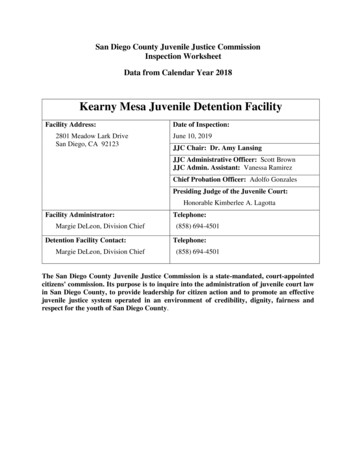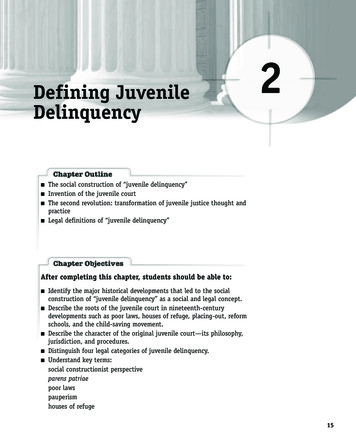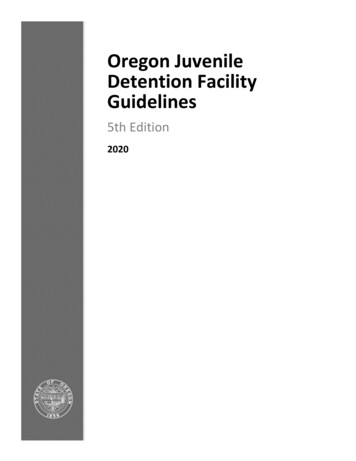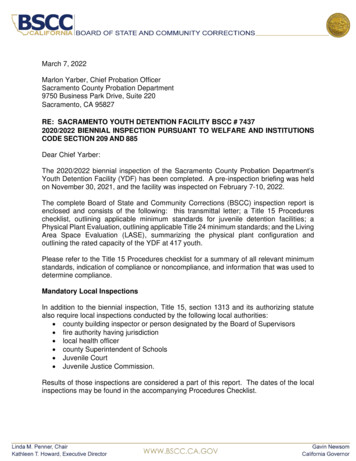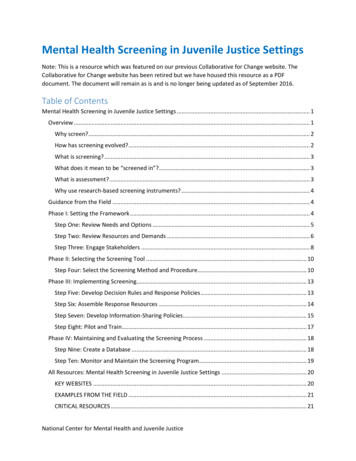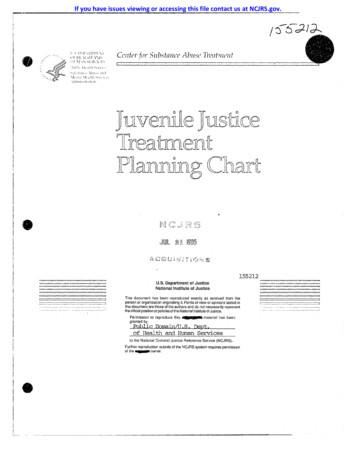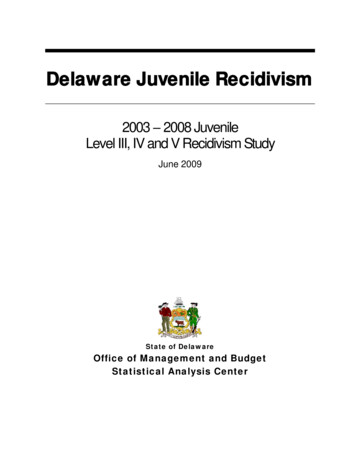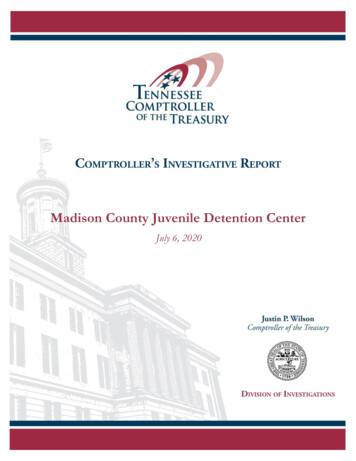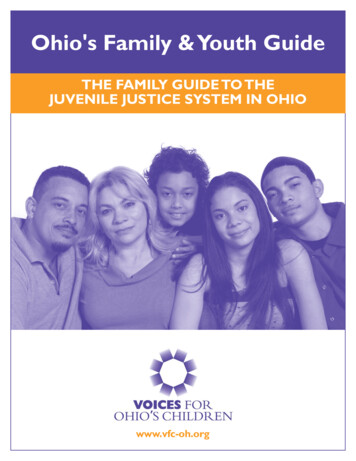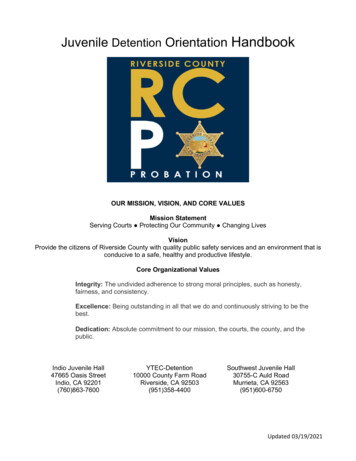
Transcription
Juvenile Detention Orientation HandbookOUR MISSION, VISION, AND CORE VALUESMission StatementServing Courts Protecting Our Community Changing LivesVisionProvide the citizens of Riverside County with quality public safety services and an environment that isconducive to a safe, healthy and productive lifestyle.Core Organizational ValuesIntegrity: The undivided adherence to strong moral principles, such as honesty,fairness, and consistency.Excellence: Being outstanding in all that we do and continuously striving to be thebest.Dedication: Absolute commitment to our mission, the courts, the county, and thepublic.Indio Juvenile Hall47665 Oasis StreetIndio, CA 92201(760)863-7600YTEC-Detention10000 County Farm RoadRiverside, CA 92503(951)358-4400Southwest Juvenile Hall30755-C Auld RoadMurrieta, CA 92563(951)600-6750Updated 03/19/2021
RIVERSIDE COUNTY PROBATION DEPARTMENTJUVENILE DETENTION ORIENTATION HANDBOOKWelcome to a Riverside County Probation Department juvenile detention facility. Thisorientation handbook will provide information about facility procedures, rules, behaviorexpectations, services and programming. Orientation is intended to reduce rule violations and toprovide a safe and secure environment for both you and staff. Provisions will be made toprovide information to youth who are impaired, disabled, or do not speak English.During your stay, you will be observed at all times. You are expected to follow the rules of thefacility at all times. You shall comply with staff's directives quickly and precisely for the safety ofyourself and others. You will receive positive incentives when behavior is appropriate orconsequences when your behavior is inappropriate. In an effort to ensure a safe and secureenvironment for all youth, and juvenile facility staff, the staff assigned to living units willrandomly search the rooms and units on a routine basis.Riverside County Probation Department has a non-discrimination provision. You shall have fairand equal access to all available services, placement, care, treatment, and benefits. It furtherprovides that no person shall be subject to discrimination or harassment on the basis of actualor perceived race, ethnic group identification, ancestry, national origin, color, religion, gender,sexual orientation, gender identity, gender expression, mental or physical disability, or HIVstatus. This assures that you will not be subject to restrictive housing or classification decisionsbased solely on any of the above mentioned categories. This section does not prohibit staff fromplacing you in a single occupancy room at your request or in accordance with Title 15regulations regarding separation.Only information that is considered relevant and necessary, and contributes to the accuracy andutility of your record shall be collected and/or contained in your file. Probation departmentrecords, legal files, and juvenile facility records are confidential and shall not be given to ordiscussed with anyone by juvenile facility staff, except with persons who have an official rightand need to know such information in the performance of their duties, i.e., probation officers, thecourt, law enforcement or to others by court order. You are entitled to anonymity. Discussionoutside the juvenile facility or with any person(s) not entitled to the information mentioned aboveis prohibited.This handbook will answer some questions about the processes you are about to go throughwhile in our facilities. If you have any questions after you have gone through this handbook, youcan ask the following Probation staff: the Duty Officer (DO), the Detention Control Officer(DCO), a Supervising Probation Officer (SPO), a Probation Corrections Officer (PCO), and/or aSenior Probation Corrections Officer (SPCO).
TABLE OF CONTENTSPage(s)Identification of Key Staff and Their Roles 1Detention Control/Intake Assessment .1Medical Assessment and Access to Health Care Service .2Behavioral Health Evaluation and Access to Counseling Services . 2Court Process . 2Non-Discrimination Policy . .2Non-English Services and Programs . .2Access to Legal Services. . .2Housing .2Change of Program. .2Advisement of Rights .2Reading Materials . 3Correspondence .4Telephone Use .4Immigration Legal Services . 4Emergencies and Evacuations . 4PREA (Prison Rape Elimination Act of 2003) . .4Faith-Based Services/Faith-Based Counseling .5Facility Rules of Conduct . 5Due Process .7Disciplinary Procedures .7Room Confinement 7Search and Seizure/Contraband. .7Restraints .7Use of Force/OC Pepper Spray .7Emergency Code Calls .8Grievance Procedure .8Visitation .9Visiting Rules and Regulations .9
Clothing and Personal Care Items .10Personal Hygiene .10Education .10Programs, Recreation and Exercise . .10Positive Behavior Incentive Programs .11Meals .11Transferring Youth between Juvenile Facilities .11Information for Parent/ Guardian. .12Access to Title 15 Minimum Standards for Juvenile Facilities. . 12
IDENTIFICATION OF KEY STAFF AND THEIR ROLES:Director/Assistant Director: They manage facility operations and personnel.Supervising Probation Officer (SPO): They are sworn Peace Officers who are in charge ofsupervising the living units within the facility. They also act as the Duty Officer (DO) who is in chargeof the daily operations of the entire facility and who is responsible for all staff and youth within thejuvenile facility.Senior Probation Corrections Officer (SPCO): They are sworn Peace Officers who oversee theliving units, provide training for PCOs and act as the DO in the absence of a SPO.Probation Corrections Officer (PCO): They are sworn Peace Officers working in the living unitstwenty-four hours a day. Their primary responsibility is to provide the youth with supervision andprogramming. You will be assigned a PCO/SPCO as a caseworker who will work with you directly.The caseworker will provide guidance based on your needs, behavior, and adjustment while detained.NOTE: You may be charged with battery upon a Peace Officer if you harm staff in any way (CaliforniaPenal Code 243.)Teacher/Correctional Health Staff/Behavioral Health Staff: These staff work on-site and are thereto assist with meeting your educational, medical and behavior health needs.DETENTION CONTROL/INTAKE ASSESSMENT: You will be asked a series of questions upon entryinto the juvenile facility. Questions will include, but are not limited to: Medical AssessmentSuicidal Ideation AssessmentEducational InformationSubstance Abuse HistoryUpon entry into the facility, you will be pat-down searched and a metal detector wand will be used toensure you are free of weapons or contraband. All contraband (lighters, smoking paraphernalia, andweapons) will be discarded. Your clothing, personal items and valuables will be inventoried andlogged. You will sign to verify the inventory. Any money or jewelry will be stored in a secure location.You will be offered a shower and issued juvenile facility clothing.Pursuant to Section 627 of the Welfare and Institutions Code (WIC):Immediately after being taken to a place of confinement and, except where physically impossible, nolater than one (1) hour after taken into custody, the youth shall be advised and has the right to maketwo (2) telephone calls from the place where the youth is being held: One (1) call completed to his/her parent(s)/legal guardian(s), a responsible relative, or theyouth’s employer.One (1) call completed to an attorney.MEDICAL ASSESSMENT AND ACCESS TO HEALTH CARE SERVICES: A Registered Nurse (RN)will ask you a series of medical questions in order to get a better sense of your health needs. Acomplete physical examination will be performed within 96 hours of admission. A medical history of past and present illness and treatment will be conducted.1
A medical examination will be conducted.Laboratory screening will be conducted (urine sample).Females will be given a urine pregnancy test (upon request).A Tuberculosis (TB) skin test will be conducted.If you are suspected of having a communicable disease that could pose a significant risk to others inthe facility you shall be placed on medical isolation until cleared by health care professionals.You are allowed access to medical care during your period of confinement.nursing request at any time. Nursing requests are located on each living unit.You may submit aBEHAVIORAL HEALTH EVALUATION AND ACCESS TO COUNSELING SERVICES: You will takethe MAYSI-2 exam which asks you a series of questions that will help the DCO and Behavioral Healthstaff identify any immediate needs you might have. You will have access to Behavioral Healthservices during your period of confinement. You may submit a Behavioral Health request at any time.Behavioral Health requests are located on each living unit.COURT PROCESS: Your allegation(s) will be reviewed by the District Attorney and Probation Officeron the next judicial (business) day after admittance into the juvenile facility. If the District Attorneydetermines the allegations against you are legally sufficient (good), and if the Probation Officerdetermines you should be detained, you will be scheduled for a Detention Hearing. If the allegation(s)include violence, possession or use of a weapon, or if you are on probation or parole, you mustappear in Juvenile Court within three (3) judicial days after being booked. If you are not on probationor parole, and the allegation(s) are misdemeanors that do not include violence, possession or use of aweapon, you must appear in Juvenile Court for a Detention Hearing within two (2) judicial days.NON-DISCRIMINATION POLICY: All youth within the juvenile facility shall have fair and equalaccess to all available services, placement, care, treatment, and benefits, and provides that no personshall be subject to discrimination or harassment on the basis of actual or perceived race, ethnic groupidentification, ancestry, nation origin, color, religion, gender, sexual orientation, gender identity,gender expression, mental or physical disability, or HIV status, including restrictive housing orclassification decisions based solely on any of the above mentioned categories. All youth have theright to be free from physical, verbal or sexual abuse and harassment by other youth and staff.NON-ENGLISH SERVICES AND PROGRAMS: Upon request, services and programs may beavailable in a language other than English if appropriate.ACCESS TO LEGAL SERVICES: You are allowed access to a licensed attorney. You are allowedaccess to telephone and in-person communications with your attorney during normal business hours.HOUSING: Based on the allegation(s) and other pertinent factors, you will be housed in a living unitwith other youth and on an identified classification. During the intake process, a comprehensiveclassification assessment will be provided. This assessment will determine a suitable housing unit foryou with consideration given to safety and security.CHANGE OF PROGRAM: If you have a request for different housing, education, programming orwork assignment, you are required to complete a “Request to See” form and submit it to unit staff.Your request will then be forwarded to the Unit Supervisor for review.ADVISEMENT OF RIGHTS: As a youth detained in a Riverside County Probation Departmentjuvenile facility, you shall have the following rights (224.71 WIC):2
To live in a safe, healthy, and clean environment conducive to treatment and rehabilitation andwhere you are treated with dignity and respect.To be free from physical, sexual, emotional, or other abuse, or corporal punishment.To receive adequate and healthy food and water, sufficient personal hygiene items, andclothing that is adequate and clean.To receive adequate and appropriate medical, dental, vision, and mental services.To refuse the administration of psychotropic and other medications consistent with applicablelaw or unless immediately necessary for the preservation of life or the prevention of seriousbodily harm.To not be searched for the purpose of harassment or humiliation or as a form of discipline orpunishment.To maintain frequent and continuing contact with parent(s)/legal guardian(s), siblings, andchildren through visits, telephone calls, and mail.To make and receive confidential telephone calls, send and receive confidential mail, andhave confidential visits with attorneys and your authorized representatives, ombudspersonsand other advocates, holders of public office, state and federal court personnel, and legalservice organizations.To have fair and equal access to all available services, placement, care, treatment, andbenefits, and to not be subjected to discrimination or harassment on the basis of actual orperceived race, ethnic group identification, ancestry, national origin, color, religion, sex, sexualorientation, gender identity, mental or physical disability, or HIV status.To have regular opportunity for age-appropriate physical exercise and recreation, includingtime spent outdoors.To contact attorneys, ombudspersons and other advocates, and representatives of state orlocal agencies, regarding conditions of confinement or violations of rights, and to be free fromretaliation for making these contacts or complaints.To participate in faith-based services and activities of their choice.To not be deprived of any of the following as a disciplinary measure: food, contact withparent(s)/legal guardian(s), or attorneys, sleep, exercise, education, bedding, access to faithbased services, a daily shower, a drinking fountain, a toilet, medical services, reading material,or the right to send and receive mail.To receive a quality education that complies with state law, to attend age-appropriate schoolclasses and to continue to receive educational services while on disciplinary or medical status.To attend all court hearings pertaining to you.To have counsel and a prompt probable cause hearing when detained on probation or paroleviolations.To make at least two free telephone calls within an hour after initially being placed in a facilityof the Division of Juvenile Facilities following an arrest.READING MATERIALS: Reading materials will be provided by the facility. Books and magazines thatglorify gang involvement; promote criminal activity and violence; demean a particular gender; promoteracial discord; or are of sexually explicit nature, are not permitted in the facility. Parent(s)/legalguardian(s) are not permitted to mail in or bring in any reading materials.3
CORRESPONDENCE: You may send and receive mail. You will be provided with pencils, paper, andenvelopes and given sufficient time to write letters. Prior to mail leaving the facility, staff will ensurethat outgoing mail is properly addressed, without slogans or symbols appearing on the outside of theenvelope. You shall not be permitted to send/receive mail to/from another Riverside County Probationjuvenile facility. Mail received from another facility shall be returned to sender. Staff shall reviewaddressees to avoid the sending of mail to another facility. You shall not be permitted any materialthat: Contains instructions for the manufacturing of drugs, explosives, or other unlawful substances;Advocates violence within the juvenile facility;Advocates racial, gender, religious or national hatred;Advocates criminal behavior;Advocates behavior against juvenile facility staff/rules;Sexually explicit material; orGang-related material.You may be placed on mail review status only by an SPO. Staff shall immediately refer you to if youappear to fit the following criteria for mail review status to a SPO, who shall make that determination.Placement on mail review status shall be based on evidence that your mail either: Advocates the direct furtherance of a specific criminal act;Advocates or encourages specific acts of violence or contains threats of suicidal intent;Advocates or plans for escape;Contains contraband; orPromotes the furtherance of gang-related activities.TELEPHONE USE: You will have access to the telephone system.IMMIGRATION LEGAL SERVICES: Should you need information or assistance with legalimmigration services, contact the unit staff and/or the unit supervisor.EMERGENCIES AND EVACUATIONS: The purpose of a fire, earthquake or evacuation drill is toestablish a procedure regarding what actions will be taken in the event of an actual fire, earthquake orin the event of a real disaster. You may be directed to “drop, cover and hold” during an earthquakedrill, until an evacuation order is given. Fire, earthquake or evacuation drills will be conductedmonthly and can occur at any time during the day. In case of emergency or if an evacuation isnecessary, you should stop all activity, remain calm and obey staff directives. Any non-compliance inan emergency may result in consequences.PREA (PRISON RAPE ELIMINATION ACT of 2003): Riverside County Probation has a zerotolerance for sexual abuse or sexual harassment amongst youth, staff, volunteers, visitors,contractors, and vendors. If you witness, suspect, or become a victim of sexual abuse or sexualharassment, you can report it by filing a grievance, telling a staff you trust, telling any BehavioralHealth staff member, or nurse, by asking to speak to the DO or a SPO or by calling the Ombudsman.If you are in need of crisis counseling regarding sexual abuse, you can contact the Riverside AreaRape Crisis Center or Coachella Valley Sexual Assault Services. There is a 1-800 hotline numberlocated in the living units. All reported incidents of sexual abuse and sexual harassment will be takenseriously and will be investigated. The department will take steps to prevent any form of retaliationfrom staff or other youth toward you for reporting incidents of sexual abuse and sexual harassment.4
Any reported incident of sexual abuse or sexual harassment will be kept confidential and on a need toknow basis. Staff are required to follow mandatory reporting laws regarding all reported allegations ofsexual abuse.FAITH-BASED SERVICES/FAITH-BASED COUNSELING: You have the right to receive faith-basedservices and practices, and/or faith-based counseling and the right to request a faith-basedrepresentative of your choice. Attendance shall be voluntary and not required. You shall be allowedto participate in normal program activities should you elect not to participate in faith-based programs.Upon your written request, and where practicable, faith-based services and/or faith-based counselingof your indicated preference will be provided to you each week. You have the right to request a faithbased/religious diet. Staff will make every effort to assure that you retain your right to privacy andconfidentiality with regard to your request for, and participation in, faith-based services and/orcounseling. If you are on disciplinary status, you shall not be denied faith-based services and/or faithbased counseling. However, special arrangements may be required if you present a safety andsecurity risk.Faith-based representatives who provide faith-based services and/or faith-based counseling to youshall be certified clergy, ordained for faith-based duties by the church or faith-based organization. Thefreedom of faith can never constitute the freedom to interfere with the peaceful rights of others, or thefreedom to disregard the rules of the juvenile facility.FACILITY RULES OF CONDUCT: It is important that you understand what is expected of you duringyour stay. You will be held responsible for your behavior. The following rules of conduct have beenestablished for the safety and security of you, other youth, staff and the juvenile facility. You shallcooperate with all staff and follow all lawful and reasonable directives. Failure to comply with theserules will result in consequences that will vary due to the gravity and seriousness of the rule violation.Rule violations shall be considered minor or major, depending on the severity of the behavior. Undercertain circumstances, minor violations may be considered major violations.Minor Rule ViolationsExamples of minor violations include, but are not limited to:a) Dangerous acts/horseplay: Dangerous acts that could result in injury to youth or others. Thisincludes horseplay activities that consist of loud, raucous behavior, rough contact orroughhousing, and/or wrestling between two or more youth.b) Disobeying staff directives/failure to comply: Engaging in disruptive or nuisance behavior oractivities.c) Suspension from school;d) Use or possession of contraband: Any item(s) concealed or found in the facility that isprohibited including, but not limited to: extra food, clothes, bedding, towels, or books.e) Lying: Intentionally deceiving staff, this can include, but not be limited to false allegations.f) Stealing: The knowing and unauthorized taking of an item belonging to another person.g) Verbal misbehavior/inappropriate language: Use of language that is considered crude,offensive, demeaning, and/or disrespectful, including irritating or harassing others; cursing;racially or gender insensitive words; and name calling or ridicule.h) Threats: An expressed intention to inflict harm, pain or injury on the person of another.i) Gambling: All forms of gambling are prohibited.j) Fighting that does not result in a serious injury, additional law violations, or extension ofcustody time: A mutual assault between two or more youth.5
k) Vandalism/destruction of property: Intentional or malicious destruction of personal property ofanother person or county property and does not result in additional law violations or extensionof custody time.l) Gang affiliated behavior including, but not limited to, written, verbal, and non-verbal gangrelated communications.m) Inappropriate sexual behavior: Activities, regardless of voluntariness, that may includeotherwise developmentally normative behaviors, norm-violating behaviors, sexual harassment,and exploitation/taking unfair advantage of another. This includes sexual comments orgestures, sexual advances, exposure, sexually explicit writing or photographs, viewingpornography, masturbatory behavior, sexual favors, sexual threats and sexting.Consequences for Minor Violationsa) Special assignments: May include redoing poor work, writing an essay, reading a book, averbal or written apology, or cleaning/restoring areas or items in the facility vandalized by theyouth (example: cleaning graffiti/tagging from a wall or table).b) Inmate Calling Engine (ICE) privileges: Youth may be temporarily restricted from ICE phonecall privileges during free time. This does not include phone call rights to attorneys, socialworkers, or the PREA Ombudsman.c) Loss in honor roll and/or incentive/canteen privileges.d) Juvenile treatment facility only:a. Placement on status review: Disciplinary action which restricts the youth’s extracurricular activities.b. Loss of furlough: The loss of a furlough is primarily a treatment decision determined bythe caseworker, SPO, and the facility manager(s).Major Rule ViolationsExamples of major violations include, but are not limited to:a) Use or possession of contraband: Any item(s) concealed or found in the facility, which may bepotentially dangerous or poses a significant safety risk and is therefore prohibited including,but not limited to drugs, lighters, matches, alcohol and weapons of any kind.b) Disobeying staff directives/failure to comply: Refusal to stop disruptive or nuisance behavior oractivities. Refusal to follow a staff’s reasonable directions to behave or perform appropriately.Refusal to obey staff directives, which results in an unsafe environment.c) Riotous behavior: When three or more youth cause a disruption or interfere with normal facilityoperations due to their actions, threats, demands, or suggestions to advocate disruption ordisturbance.d) Escape attempts: Any act to undermine the security of the facility, such as obtaining a key,conspiring to escape, aiding or abetting, attempting to escape or acquiring implements whichcould be used to escape.e) Sexual assault: Touching without penetration (either directly or through the clothing) of thegenitalia, anus, groin, breast, inner thigh, or buttocks by a youth of another youth without thelatter’s consent, or of a youth who is coerced into sexual contact by threats of violence, or of ayouth who is unable to consent or refuse. Any sexual penetration by a youth of another youthincluding contact between the penis and the vagina or the anus; contact between the mouthand penis, vagina, or anus; or penetration of the anal or genital opening of another person bya hand, finger, or other object. Refer to Juvenile Facility Services Policy: Prison RapeElimination Act (PREA) of 2003.f) Battery: Any willful and unlawful use of force or violence upon another person. An intentionalphysical attack.6
g) Vandalism/destruction of property or fire setting: Intentional or malicious destruction ofpersonal property of another person or county property that can result in additional lawviolations or extension of custody time.h) Stealing: The knowing and unauthorized taking of an item belonging to the juvenile facility orany juvenile facility staff.Consequences for Major Violationsa) Extension of custody commitment time in a juvenile facility: When legally authorized per courtorder, additional time shall be added to the original court-ordered sentence.b) Additional charges may be filed in court if a new law violation is committed.c) Removal from the treatment program (juvenile treatment facility only).DUE PROCESS: If you are receiving major discipline you have due process rights. You will beadvised of allegations, given the opportunity to respond, call witnesses, given notice of the disciplinehearing, given rights of the discipline hearing, and referred to the disciplinary hearing officer.DISCIPLINARY PROCEDURES: While detained at a juvenile facility, staff will make every effort tomaintain control of the youth through methods of positive reinforcement, such as incentive/pointsystem programs, which involve rewarding desirable behavior. The goal of the facility is to avoiddiscipline problems by establishing an atmosphere of mutual respect and cooperation. Staff will setan example of courtesy and consideration in their daily interactions with you and the same is expectedin return. Discipline shall be imposed at the least restrictive level needed to promote the desiredbehavior and shall commensurate with the seriousness of the misconduct. Disciplinary proceduresshall only be administered by designated staff and shall be reviewed by the SPO or the DO on aregular basis. Staff shall clearly communicate to you the reason(s) for any disciplinary action. Thediscipline will show a direct relationship between the negative behavior and the consequence. Groupdiscipline and corporal punishment are not permitted.ROOM CONFINEMENT: While detained at a facility, it may become necessary to remove you fromthe group setting to maintain order, security of the facility, and ensure the safety of all youth by placingyou in a room. When you are placed on room confinement status, such status will be reviewedregularly by a SPO or the DO to determine if this status is, or remains, necessary and appropriate.While on room confinement status, you shall not be deprived of your legal rights. It is the objective ofthe staff to return you to regular group status at the earliest opportunity. Staff shall make everyattempt to use all appropriate counseling methods and implement the least restrictive measure beforeplacing you on room confinement status.SEARCH AND SEIZURE/CONTRABAND: Each youth is subject to searches. Living units, youth’spersonal belongings and assigned rooms may be searched on a routine or random basis. Items thatare not allowed will be removed and are considered contraband, and can result in consequences.RESTRAINTS: Physical restraints for behavior control purposes shall be used if you present animmediate danger to yourself or others, or exhibit behavior which results in the destruction of property.Staff may use restraints handcuffs, ankle shackles, waist chains and the Wrap to prevent you fromacting out violently. Mechanical restraints are also used when transporting you to Court or outside ofthe facility.USE OF FORCE/OC PEPPER SPRAY: To ensure the physical safety and security of all youth, staffand visitors within the facility, as well as the public, staff will use the level of authorized defensive7
force needed to stop aggressive behavior. Such force may include, but is not limited to the use of OCpepper spray. When possible, staff will issue a verbal warning that OC spray is going to be used. Ifyou hear this warning, stop what you are doing and lay face down on the floor and w
records, legal files, and juvenile facility records are confidential and shall not be given to or discussed with anyone by juvenile facility staff, except with persons who have an official right and need to know such information in the performance of their duties, i.e., probation officers, the court, law enforcement or to others by court order.
